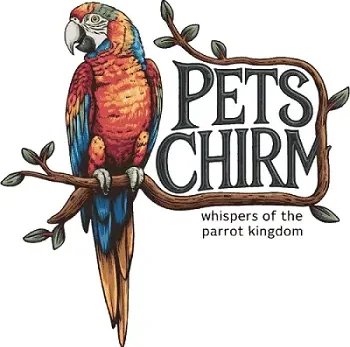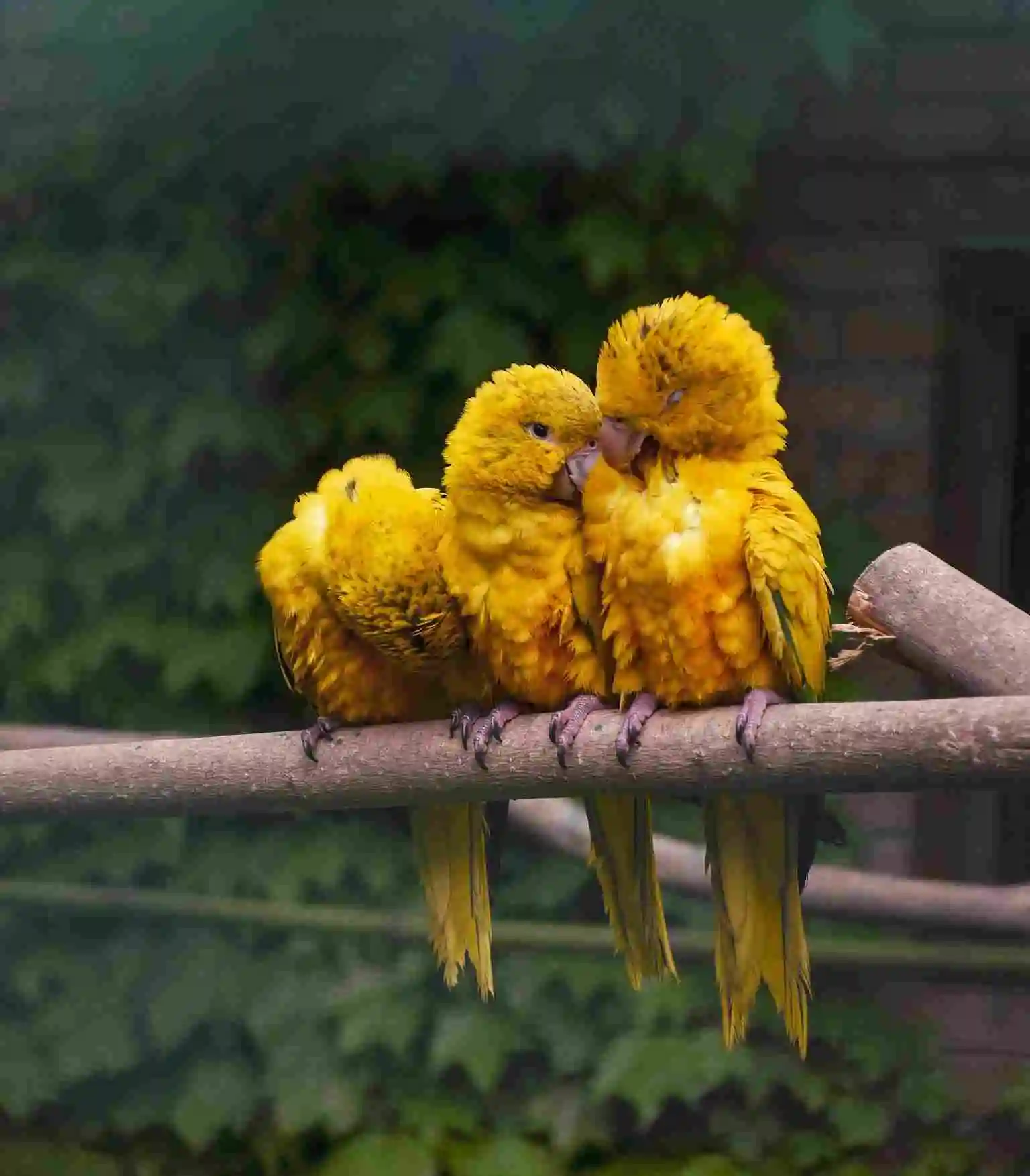Parrot lovers must know about conures due to their beauty, small size, and their variety of color variation. In bird lovers, they are renowned for their smartness, vivid and dazzling colors, and their energetic nature. Like the rule of nature, some beautiful species of conure become extinct or some become very rare
Here I explain the 10 rare conure species who are they, their personalities, and about their biological makeup.
1. Golden Conure Or Golden Parakeet (Guaruba guarouba)
Habitat & Origin:
Golden Conure originates from South American Countries including Brazil. They are found in Amazon forests.
Appearance & Behavior:
Golden Conure has vivid yellow bright color on feathers and some green spots on its feathers. Golden Conure is very social bird due to its friendly and loving nature.
Conservation Status:
Efforts are made to protect this specie but due to environment or habitat loss and other difficulties they becomes rare and more rare.
2. Queen of Bavaria Conure (Aratinga guarouba)
Habitat & Origin: The Queen of Bavaria is often considered synonymous with the Golden Conure. It shares the same habitat in the Amazon rainforest and is known for its striking appearance.
Both Golden Conure and Queen of Bavaria is considered similar.
Appearance & Behavior: This conure species is a visual marvel, boasting all-yellow plumage with green highlights on its wings. They’re incredibly social, forming strong bonds with their owners, making them popular despite their rarity.
Care Tips: Due to their sensitive nature, they require plenty of social interaction and a spacious cage to thrive.
3. Blue-Crowned Conure (Thectocercus acuticaudatus)
Habitat & Origin:
Blue Crowned Conure is mostly found in areas of South America in which Brazil, Colombia and Venezuela are most prominent.
Appearance & Behavior:
Blue-crowned Conure has a green coloration on their body while having a lovely blue color on their head as a crown. These parrots are thought to be very quiet.
Unique Traits:
Environmental habitat loss, and because of several difficulties their traits are not widely known.
4. Cherry-Headed Conure Or Red Masked Conure (Pyrrhura molinae)
Habitat & Origin:
They are also found in South America but in different areas like Peru and Ecuador.
Appearance & Behavior:
They have beautiful biological makeup in which they have a green color body with bright and vivid red color heads, that’s the thing that makes them captivating.
Special Considerations:
This parrot needs mental stimulation so toys and perches are the best option which keeps them away from boredom.
5. Black-Capped Conure (Pyrrhura rupicola)
Habitat & Origin:
Like others, they are also found in South American areas including Peru, Brazil, and Bolivia.
Appearance & Behavior:
They are black in color on their head as a cap, that’s why they are called Black-Capped Conure. They are affectionate and quiet nature parrots.
Rarity Factor:
They are very rare parrots in their whole area in comparison to others.
6. Crimson-Bellied Conure (Pyrrhura perlata)
Habitat & Origin:
They belong to the rainforest areas of the Amazon Forests.
Appearance & Behavior:
They have good and multiple combinations of colors that make them striking. They have green color on their front body, green color on wings, and blue color on flight feathers.
Care Needs:
For their diet, good quality pellets, fruits, and vegetables are good while wild parrots mostly diet includes seeds, nuts, etc.
7. Painted Conure (Pyrrhura picta)
Habitat & Origin:
They are found in Venezuela and Brazil and some nearby areas.
Appearance & Behavior:
You wonder why it’s called painted conure the reason is that it has multiple colors on its complete body like blue, green, and red. They are considered intelligent and very curious birds. They are very small-sized parrots.
Special Care Tips:
They have good intelligence, so they need healthy mental activities like puzzles toy and some sort of training sessions.
8. Pearly Conure (Pyrrhura lepida)
Habitat & Origin:
This species belongs to Brazil.
Appearance & Behavior:
They have a green color on the body and a beautiful pearly white color on the chest feathers. They are very gentle and affectionate. Mostly, conures are quiet parrots.
Unique Challenges:
They have a bad problem of feather plucking if they don’t get proper care and diet.
9. Half-Moon Conure (Eupsittula canicularis)
Habitat & Origin:
They are not found in South America but in Central America areas like Mexico, Costa Rica and their nearby areas.
Appearance & Behavior:
Half-Moon Conure is a small-sized parrot having a half-moon pattern on its wings. They are very social birds and possess mimicking speech.
Pet Suitability:
They are good talkative and a good companion who needs a good social relation.
10. White-Eyed Conure (Psittacara leucophthalmus)
Habitat & Origin:
They are not in some specific area but are spread throughout the whole area of South America.
Appearance & Behavior:
They have a white color around their eyes, giving a white ring shape. Their nature includes curious, and playfulness, and they have the habit of chewing toys.
Conservation Efforts:
Time by Time their rareness increases, which makes it difficult to find them.
Comparing Rare Conure Species to Common Conures
Understanding the differences between rare and common conures can help prospective owners make informed decisions. Rare species often have more specific care requirements, and unique temperaments, and can be more costly due to their limited availability.
Care Requirements for Rare Conure Species
Taking care of rare conures requires knowledge and preparation:
- Shelter Needs: Provide roomy cages to keep up with their active nature.
- Diet: Pellets, seeds, fruits, nuts and vegetables are a best diet for them and for every parrot.
- Social Interaction: Rare conures are often social and need regular interaction with their owners to stay happy and healthy.
Behavior and Training of Rare Conure Species
Training rare conures can be a rewarding experience:
- Understanding Temperament: Each species has a distinct personality, so it’s crucial to adapt training techniques.
- Effective Training Tips: Use positive reinforcement, treats, and consistent interaction to teach them tricks and commands.
- Socialization Tips: Introduce your bird to new environments gradually to prevent stress or behavioral problems.
Where to Find Rare Conure Species
Locating a rare conure can be challenging:
- Reputable Breeders: Seek breeders who specialize in rare conures to ensure healthy, ethically raised birds.
- Adoption Options: Consider adopting from bird rescues and sanctuaries that may house rare conures.
- Bird Shows and Events: Attend bird exhibitions to learn more and connect with experts and breeders.
Conservation Status of Rare Conure Species
Not only conures but all birds and animals are facing the threat of extinction. Day By Day every species which is necessary to keep the beauty of nature maintained becomes extinct or near to extinct.
What Can We Do:
We should work to conserve these rare species. All these species extinction causes are because of humans.
- We should purify the water from the chemicals of industries.
- We should stop and do high fines on such industries that are polluting the air, water, and soil.
- We should grow as many trees as we can and build forests as many forests as we can.
- We should take very rare species and start their breeding in an ideal way.
Pros and Cons of Owning Rare Conure Species
Pros:
- Unique appearance and traits
- Often more affectionate and social
- Ideal for bird enthusiasts seeking something special
Cons:
- Higher cost and maintenance
- May require specialized care
- Can be challenging to find reputable breeders
Common Questions About Rare Conure Species
- What Is the Rarest Conure Species in the World?
Golden Conure is most rarest conure parrot species.
- How Expensive Are Rare Conures?
Rare Conure Parrot Specie price ranges from 500 to 3000$.
- How Long Do Rare Conure Species Typically Live?
Most rare conures can live between 20 to 30 years with proper care.
- Do Rare Conures Require Special Care Compared to Common Conures?
Yes, rare conures often have specific dietary and social needs that require extra attention.
- Are Rare Conures Good for First-Time Bird Owners?
No, all parrots need care but rare conure or parrot species need extra care which is known by those persons who are not first in this race.

